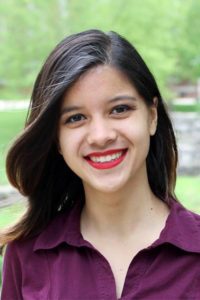Hayes Finds Her Passion at Intersection of Politics and Nuclear Energy

Graduate student Alyssa Hayes found an interest in state and federal politics in her first year of high school, long before she discovered her interest in nuclear engineering, spending a year as an intern for Illinois State Senator Melinda Bush when she was only 15. Then, while studying at the University of Illinois as an undergraduate student, she used the power of grassroots organizing to help garner support for legislation that ended up saving two nuclear plants from premature decommissioning.
Now, during her time at UT, she’s become a delegate with the Nuclear Engineering Student Delegation (NESD) to join other nuclear engineering students from across the country to push for federal policies that impact the nuclear industry. Her engagement with this national organization even helped clarify her career goals.
“NESD has opened new doors of opportunity for me to learn about nuclear politics at the federal level and build a network of relationships with staffers and distinguished advocates,” said Hayes. “During non-Congressional advisory meetings with various offices and organizations, we interviewed guests from across The Hill. Through those conversations, I realized that political nuclear advocacy is what I want to do with my post-graduate career.”
One of the people responsible for encouraging and inspiring Hayes to join the organization was the chair of the 2020 NESD, Jillian Newmeyer, also an NE alumnus. The other is Hannah Gardiner, now a federal program manager for the Department of Energy (DOE), who Hayes met at the University of Florida at the 2018 ANS Student Conference. NESD typically meets annually for a week in July in Washington, DC.
Every year, undergraduate and graduate students collaborate to research current federal bills concerning nuclear engineering and then select the most important bills to write a policy statement. When Hayes attended in November 2020, the delegation was fully virtual due to COVID-19 travel restrictions.
The 2020 policy statement focused on education and research, advanced reactor technology, and nuclear waste storage by advocating for the American Energy Innovation Act. Delegates then meet with US Congressional offices to lobby and advocate for those bills and interests. Throughout the week, they also meet with staff from the Office of the Nuclear Energy in the DOE, ANS Congressional Fellows, nuclear interest groups, think tanks, and other prominent members of the nuclear political community.
The most notable person Hayes and the other delegates interviewed was Rita Baranwal, the former assistant secretary for the Office of Nuclear Energy.
Between the writing, communications, and lobbying, she enjoyed every bit of her experience with NESD and said it was an impactful experience she would recommend to anyone who loves to tell others why they love nuclear energy.